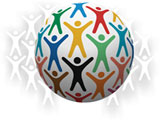World Conference looks at health impact of social inequities
 Rio de Janeiro, October 19, 2011 (PAHO / WHO) - High-level representatives more than 100 countries are meeting this week in Rio de Janeiro for the World Conference on Social Determinants of Health, an initiative of the World Health Organization (WHO) that aims to generate support policies and strategies to improve health by reducing social inequities.
Rio de Janeiro, October 19, 2011 (PAHO / WHO) - High-level representatives more than 100 countries are meeting this week in Rio de Janeiro for the World Conference on Social Determinants of Health, an initiative of the World Health Organization (WHO) that aims to generate support policies and strategies to improve health by reducing social inequities.
More than 60 health ministers and other cabinet members will participate at the conference, representatives of civil society organizations, health experts and others. The conference will conclude with a statement policy in which the WHO member states expressed their commitment to address the social determinants of health strategies and plans national action.
At the conference, officials will discuss the impact of social such as inequality in income, educational opportunities, the gender, race and ethnicity on the health of populations. Also share successful experiences of different countries and regions.
The aim of this conference is to advance the recommendations of the Commission on Social Determinants of Health WHO. In its report of 2008 "Closing the gap in a generation," the commission showed how social inequalities related to the distribution of income / wealth, ethnicity and race, gender, education, disability, sexual orientation and location geographically may have profound implications for the health, quality of life and life expectancy of different population groups within countries and the region.
In the Americas, the key determinants of health are:
- Transportation. Systems and transport infrastructure in the Americas favor cars and produce some 142,000 deaths and 5 million injuries each year. Pedestrians, cyclists and motorcyclists are the most vulnerable.
- Housing. People living in poor urban areas and rural areas usually have the weakest health conditions, lack of services water and sanitation, and other housing-related problems. Residents of rural areas are often more vulnerable to insect-borne diseases and parasites, due to precarious conditions of their homes or the environment in which they move.
- Environment. Rapid urbanization and unplanned has increased vulnerability to natural disasters such as floods, earthquakes and hurricanes.
- Changes in lifestyles. The nutrition transition is occurring in the Americas makes consumers are changing their diets consumption of traditional food fresh for more modern diets calories and processed foods. Many urban areas have no spaces recreation or adequate security for outdoor activities.
The report of the Commission on Social Determinants of Health urged governments to incorporate health into all public policies to reduce health inequalities and promote development.
Since the publication of this Report, countries have adopted a series of strategies and programs contemplate the impact of the determinants of health. Participants in the conference will discuss the lessons learned from these strategies and programs, many of which are from the Americas:
In Brazil, Bolsa Familia is the conditional cash transfer program Cash world's largest, reaching nearly 13 million 5564 families in municipalities in the country. The program has reduced food insecurity and childhood growth has improved between families involved. He has also contributed to income distribution more equitable nationwide.
In Chile, the Agenda, "Steps to Health Equity" was made by the Ministry of Health and regional health authorities to implement the recommendations of the Commission on Social Determinants of Health WHO. Among the steps identified include quantification and monitoring of health inequities, evaluation of effects on these inequities of health policies and programs, as well as identification of interventions that involve the community and other sectors. The agenda covers areas including prenatal care and childhood early, working conditions and barriers to access health services.
In Canada, the Reference Group on Social Determinants of Health brings together experts and stakeholders to review the evidence, explore opportunities for action and facilitate partnerships between sectors such as business, labor, social and community development, education, urban planning and environment policies and to promote collaboration on health inequities.
In the U.S., the National Alliance for Action to end Health Disparities is sponsored by the Department of Health and Human Services Human and its Office of Minority Health. Its National Strategy to Achieve Health Equity includes some 20 strategies conducted at the community level and seek to close the gap in access to health for communities racial, ethnic, and without access to the country.
The three-day conference will open on Wednesday October 19 at the time 2 pm (12 pm Washington, DC) and could be followed by webcast (see links).
Among the major exhibitors include:
- Margaret Chan, WHO Director General
- Alexandre Padilha, Brazil's Health Minister and Chairman of the Conference
- Michel Temer, acting President of Brazil
- Tereza Campello, Minister of Social Development in Brazil
- Rebeca Grynspan, Associate Administrator of United Nations Program Development Programme (UNDP)
- Andreas Loverdos, Minister of Health and Social Solidarity of Greece
- Kathleen Sebelius, Secretary of Health and Human Services of the United States of America
- Michel Sidibé, UNAIDS Executive Director
- Maria Guzenina-Richardson, Minister of Health and Social Services of Finland and Vice-President of the Conference
NOTE ON WEBCAST:
Plenary sessions will be broadcast live in English, Spanish, Portuguese and French at:
http://www.canal.fiocruz.br/determinantes/
The parallel sessions will be broadcast live in English and Portuguese:
http://www.canal.fiocruz.br/determinantes/index_salas.php
Source: www.fiocruz.br
